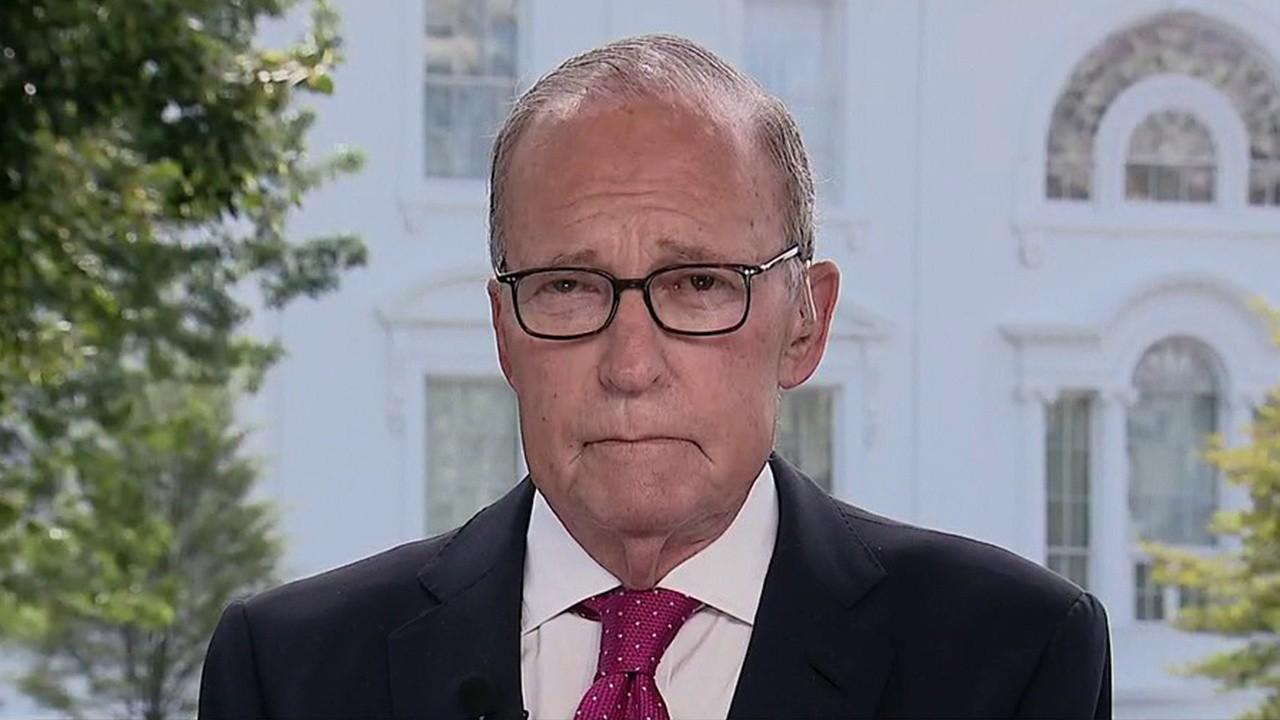Kudlow believes Trump will use executive action for coronavirus relief: 'You can bet on it'
'He will use them,' Kudlow said of Trump's executive powers. 'You can bet on it'
White House economic adviser Larry Kudlow said he believes President Trump will use some sort of executive authority to push through a payroll tax cut and other provisions for economic relief amid the coronavirus pandemic, as negotiations for a fourth stimulus package are deadlocked on Capitol Hill.
During an interview with FOX Business on Friday, Kudlow said the president is “looking carefully” at executive action to address several provisions that have reached a stalemate in negotiations between Republican and Democratic lawmakers and the White House.
Kudlow said that if “Democrats don’t want to make a deal,” the president could push forward with an executive order to address some of his top priorities Trump administration officials are pushing to be included in a fourth stimulus relief bill.
“The president is looking for a payroll tax cut, administrative actions for moratorium, executive authorities on unemployment, re-employment, retention credit -- those are essential on his list,” Kudlow explained, adding the administration “wants to keep the momentum going.”
When asked if he thought the president would use executive authority, Kudlow said: “I believe he will.”
“I don’t want to make a prediction,” he said, adding that it is “up to him,” and noting that the “federal powers are at the president’s disposal.”
“He will use them,” Kudlow said. “You can bet on it.”
All employees and employers pay a 6.2% payroll tax on wages capped out at $137,700. Right now, an employee earning $50,000 per year would pay $3,100 in payroll taxes. That money goes toward specific programs like Social Security, health care, unemployment compensation and workers’ compensation. Workers also pay a Medicare tax of 1.45%.
To pause payroll taxes, the Trump administration could employ a section of the tax code that allows the Treasury secretary to postpone certain tax-related deadlines during a federally declared disaster.
It's the same authority the Treasury Department used earlier in the year to delay the April 15 tax-filing deadline until July 15. The move would technically make it a deferral of payroll taxes -- not a suspension -- but according to a Wall Street Journal op-ed penned on Sunday by Stephen Moore, a member of Trump's economic recovery task force, and Phil Kerpen, president of the Committee to Unleash Prosperity, Trump could pledge to sign a bill to forgive those payments.
"That would make the election a referendum on middle-class taxes. Mr. Trump can give Americans a tax cut now, and sign it into law later," they wrote.
Kudlow’s comments come after the president this week said he would not hesitate to take executive action if talks on Capitol Hill came to a stalemate.
The president also tweeted this week that: “I’ve notified my staff to continue working on an Executive Order with respect to Payroll Tax Cut, Eviction Protections, Unemployment Extensions, and Student Loan Repayment Options.”
Earlier in the week, Trump said he was considering taking executive action to halt evictions and suspend payroll taxes.
“A lot of people are going to be evicted, but I’m going to stop it because I’ll do it myself if I have to,” Trump told reporters at the White House. “I have a lot of powers with respect to executive orders, and we’re looking at that very seriously right now.”
There are some 110 million Americans living in rental households; up to 23 million renters – or 20 percent – are at risk of eviction by Sept. 30, according to an analysis by the COVID-19 Eviction Defense Project.
With the supplemental $600 in unemployment benefits now officially lapsed, about 24 million Americans say they have little to no chance of being able to pay next month's rent, according to a survey by the U.S. Census Bureau.
Rent and mortgage payments are typically the largest monthly expense for Americans: One in four tenant families pays more than half of its income for rent, a rate that’s even higher in cities like San Francisco and New York, according to Harvard’s Joint Center for Housing Studies.
WHITE HOUSE, REPUBLICAN PROPOSAL CUTS JOBLESS AID FROM $600 TO $200
“They’re thrown out viciously," Trump said. "It's not their fault."
The president similarly suggested that he could use his executive authority to lower payroll taxes — a proposal that he's advocated for since the beginning of the virus-induced economic crisis, but one that has garnered little support from both Democrats and Republicans.
“I can do that also through executive order, so we’ll be talking about that,” Trump said.




















